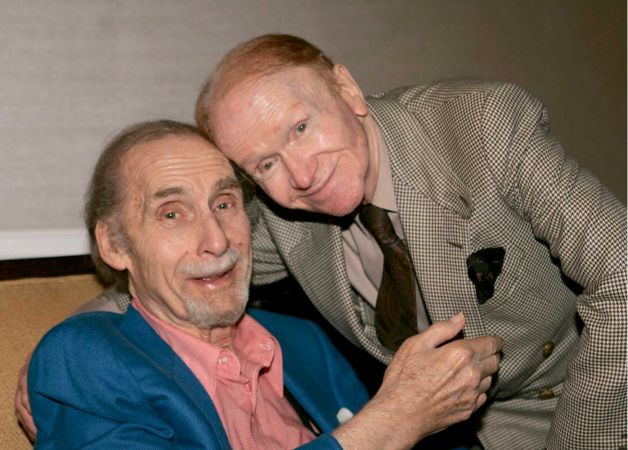 One of the last public appearances for Sid Caesar, the great TV clown who died Wednesday at 91, came at one of the stranger sessions of the TV Critics Association press tour in recent years.
One of the last public appearances for Sid Caesar, the great TV clown who died Wednesday at 91, came at one of the stranger sessions of the TV Critics Association press tour in recent years.
The July 2005 session for the first “Pioneers of Television” was overshadowed in degrees of crazy by Mickey Rooney, Rose Marie and Red Buttons, with whom he is pictured here. Even Carl Reiner was on the panel.
None looked great in their elder years. And while Rose Marie was breathing heavily, Caesar, then 82, looked worse — frail, pale and hardly moving. But when he was asked a question, he was so lucid and percolating with the kind of onomatopoeia that informed his inspired foreign characters, you almost thought his old-man appearance was just another bit.
“Television brought an awful lot of things to our lives,” Caesar said. But one aspect of it was more important. “The remote control took over the timing of the world. That’s why you have road rage and why you have people who have no patience, because you got immediate gratification; you got click, click, click, click. If it doesn’t explode within three seconds, click, click, click, click, click, click, click, click — `eh, nothing on.”’
That’s right: transcribers counted eight clicks in a row, 15 altogether.
He had the same problem with modern music “We went the entire circle, from drum through all the instruments and all the symphonies and this and that, and we’re back to drums: dum, dum, dum, dum, dum …”
It all had to do with rhythms. “Every culture is known by its music,” he said. “I haven’t heard many melodies lately. To think that when we had the melodies, everything would seem to go right. Today, there’s no melodies, just the drum.”
Caesar was the master of the heavily accented, fast-paced nonsense – whole bits were created out of nonsensical syllables and gestures that nonetheless communicated specific characters in a form he created and could only do himself, Double Speak — done with the kind of brilliance unmatched by comedians since.
At the same time he could play the sophisticate, the straight man who didn’t appreciate the health food restaurant Imogene Coca took him to, in skits that had the luxury of spreading out past a few minutes to more than 10.
“When we did ‘Caesar’s Hour,’” Reiner recalled, “Sid always had an idea that comedy was more important than dancing. I don’t know how he got that idea, but on ‘Milton Berle,’ Sid was sometimes constrained to do a sketch that he knew wouldn’t be constrained in seven minutes. He liked to do a 10 minute sketch or a 12 minute sketch, so when Milton Berle ended, Sid was like a racehorse out of the barn. He was ready to go with 25 minute takeoffs of movies.”
“Well, I always felt that, us, 16 choruses of a song is enough,” Caesar said. “When I got my own show, I said there will be four minutes of singing and dancing and the rest will be for comedy.
“Instead of the sketches being five, six, seven minutes long, they became 10 and then 15 and then we did the whole show, when we did the dancing towers. We did satires of movies and it was just marvelous because it opened up a whole new field for me and everybody, because we could see you had the time. You weren’t rushed.
“And one thing I got to say about live performances: When you’re live, you’re in charge. There’s nobody going to cut you and clip you and badeedapbadump and change the whole scene. Live – you did it. You knew you had to make it on time and and you could talk or you could make it long.”
And it was a crazy, frenetic, largely improvised comedy that captivated the nation and helped build TV in its early days to the force it would become.
It was hard to pick one clip to show the artistry of Caesar to frankly an audience that may have forgotten him, but here are a few. One is a raucous parody of “This is Your Life,” the two others use his Double Speak, one as a German soldier, the other decades later apparently at a salute to Bob Hope – in four dialects. Your laughter is the best way to remember him.